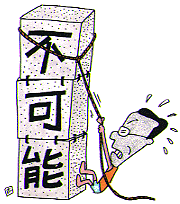Experiences in the conquest of neurosis by Morita Therapy
[Experiences]
Victory over gastrointestinal neurosis lasting 40 yearS
By Mr. Tsuneo Okamoto, Director of The Mental Health Okamoto Memorial Foundation
A return from siberia with stomach illness
I was in China when W.W.II was over in 1945. Together with my fellow soldiers I was captured by Soviet forces and taken away to Siberia, where I stayed for four years. At the outset, the meals served there were very poor; only soy beans were given us for over a month. So I suffered from diarrhea, the condition lasting for days. After that I began concentrating my attention on my stomach, taking only two meals a day, going without breakfast. For fifteen years after my return from Siberia I ate bread and noodles as staples, and only easily digestible foods as side dishes. Nevertheless, I had stomach problems whenever I overate a little, ate fatty foods, or had a snack between meals. This was indeed a chronic disease.
My meals were finally reduced to one meal a day with a consequent weight loss
 I begun to lose my appetite in the autumn of 1986 when I was vice-president and sales manager at the headquarters of Nichii Co., Ltd. For several days during the month I had taken only one meal a day. In the following spring, such a practice had turned out to be a daily habit.
I begun to lose my appetite in the autumn of 1986 when I was vice-president and sales manager at the headquarters of Nichii Co., Ltd. For several days during the month I had taken only one meal a day. In the following spring, such a practice had turned out to be a daily habit.
The meal in question consisted of half a slice of bread, a cup of soup, half a piece of egg, and a small amount of ice cream. In this connection, my ordinary body weight of 45 kilograms had finally been reduced to 36 kilograms. I had difficulties even in taking a walk.
After visits to different hospitals
 With a fervent wish to cure my stomach by all means, I tried a variety of medical treatments. I started visiting several different hospitals to undergo physical examinations. Meanwhile, I tried all that was recommended by others such as drugs, health foods, and many practices to keep fit. However, such attempts were all in vain. I felt distressed about my puzzling decreased appetite. (As a result of the examinations conducted in the hospitals, my illness was diagnosed as gastroptosis, leukopenia, and malnutrition.)
With a fervent wish to cure my stomach by all means, I tried a variety of medical treatments. I started visiting several different hospitals to undergo physical examinations. Meanwhile, I tried all that was recommended by others such as drugs, health foods, and many practices to keep fit. However, such attempts were all in vain. I felt distressed about my puzzling decreased appetite. (As a result of the examinations conducted in the hospitals, my illness was diagnosed as gastroptosis, leukopenia, and malnutrition.)
One day, I happened to meet with one of my friends, Mr. Teruo Onishi, and told him about my physical condition. He told me he had suffered from the same condition as mine, but he had successfully recovered thanks to Morita Therapy. At that time, he presented me with several books and cassette tapes on Morita Therapy. This is how I came across Morita Therapy.
What I have learned from Morita Therapy
At the time when Mr. Onishi recited his experiences to me, I had a kind of presentiment that this would perhaps cure my stomach. Since then, I made it a rule to listen to the cassette tapes on Morita Therapy while commuting, writing down important matters in my notebook. Such study has continued uninterrupted.
 Furthermore, Mr. Onishi advised me that if I relaxed and took three meals a day all I had eaten would never fail to be digested by my stomach unless I worried about it. So I began to take three light meals a day. Astonishingly, nothing serious happened after the start of my experiment. This was thanks to the knowledge about my afflictions gained from Morita Therapy, I believe.
Furthermore, Mr. Onishi advised me that if I relaxed and took three meals a day all I had eaten would never fail to be digested by my stomach unless I worried about it. So I began to take three light meals a day. Astonishingly, nothing serious happened after the start of my experiment. This was thanks to the knowledge about my afflictions gained from Morita Therapy, I believe.
 It is safe to say that I was simply possessed with the idea that I could not eat. I gradually increased the amounts eaten during meals. To my surprise, beginning the following month, my weight increased by two kilograms every month. I reached a little less than fifty kilograms after half a year. Fortunately, I became well in mind and body, and I am still so.
It is safe to say that I was simply possessed with the idea that I could not eat. I gradually increased the amounts eaten during meals. To my surprise, beginning the following month, my weight increased by two kilograms every month. I reached a little less than fifty kilograms after half a year. Fortunately, I became well in mind and body, and I am still so.
The cause was psychological
Now looking back over the past I was lucky to come across Morita Therapy and get back to a healthy condition again. I shudder when I imagine what might have been if there had not been such an encounter. First of all, I could understand the cause of my stomach disorder by learning the theory of Morita Therapy. A search for the cause of my trouble led me to the fact that I had always been worried about having a stomach condition and eating since I was detained in the Siberian p.o.w. camp. Another fact is that I was a perfectionist; I have forced myself to aim for perfect performance in my job at all times.
 The mental conflict between the "anxiety and perfectionism" (vicious cycle) was a cause of my neurosis. Both the cases of Mr. Onishi and myself are unusual in that we both could cure ourselves using only books and cassette tapes for a short period of time. I would think that we had the ability to easily accept Morita Therapy. Let's look at the reasons for our success.
The mental conflict between the "anxiety and perfectionism" (vicious cycle) was a cause of my neurosis. Both the cases of Mr. Onishi and myself are unusual in that we both could cure ourselves using only books and cassette tapes for a short period of time. I would think that we had the ability to easily accept Morita Therapy. Let's look at the reasons for our success.
- We had previously studied various methods for maintaining health as formulated from mental and physical points of view, and so acquired the basic knowledge.
- This was our only hope because, after our long struggle to overcome our mental and physical disorders, we had tried various other treatments.
- As we had such severe troubles in life we could not only understand the theory of Morita Therapy intellectually but we could also understand it on the basis of our experiences.
 At any rate, Morita Therapy encourages us to follow one's "desire to live fully" (desire for life and for self-improvement) by correcting wrong views and thinking realistically so that proper effort is made to attain a goal. That is, the theory of this therapy teaches us that recovery from neurosis is the result of a constructive practice of living together with anxiety or fear.
At any rate, Morita Therapy encourages us to follow one's "desire to live fully" (desire for life and for self-improvement) by correcting wrong views and thinking realistically so that proper effort is made to attain a goal. That is, the theory of this therapy teaches us that recovery from neurosis is the result of a constructive practice of living together with anxiety or fear.
